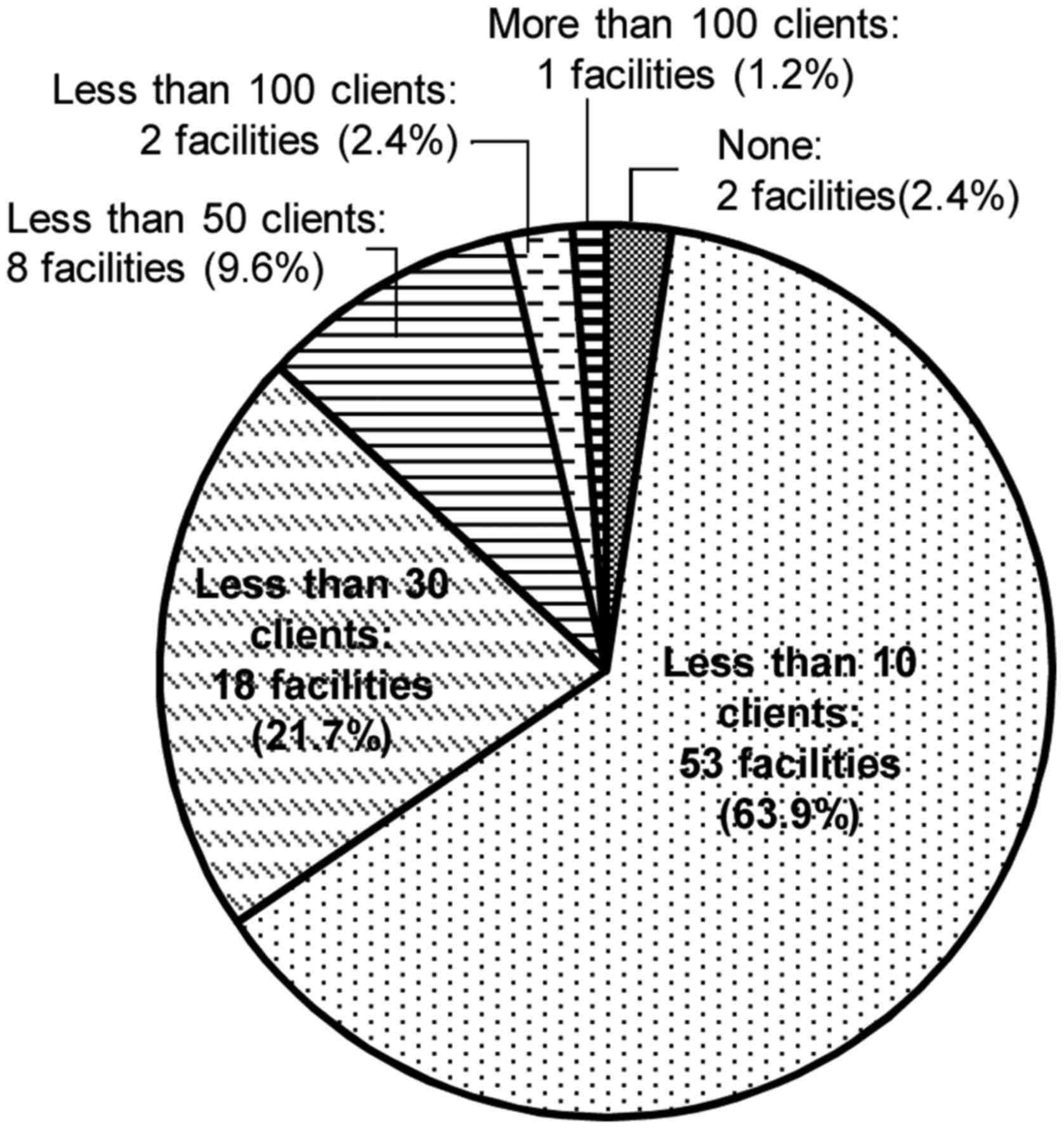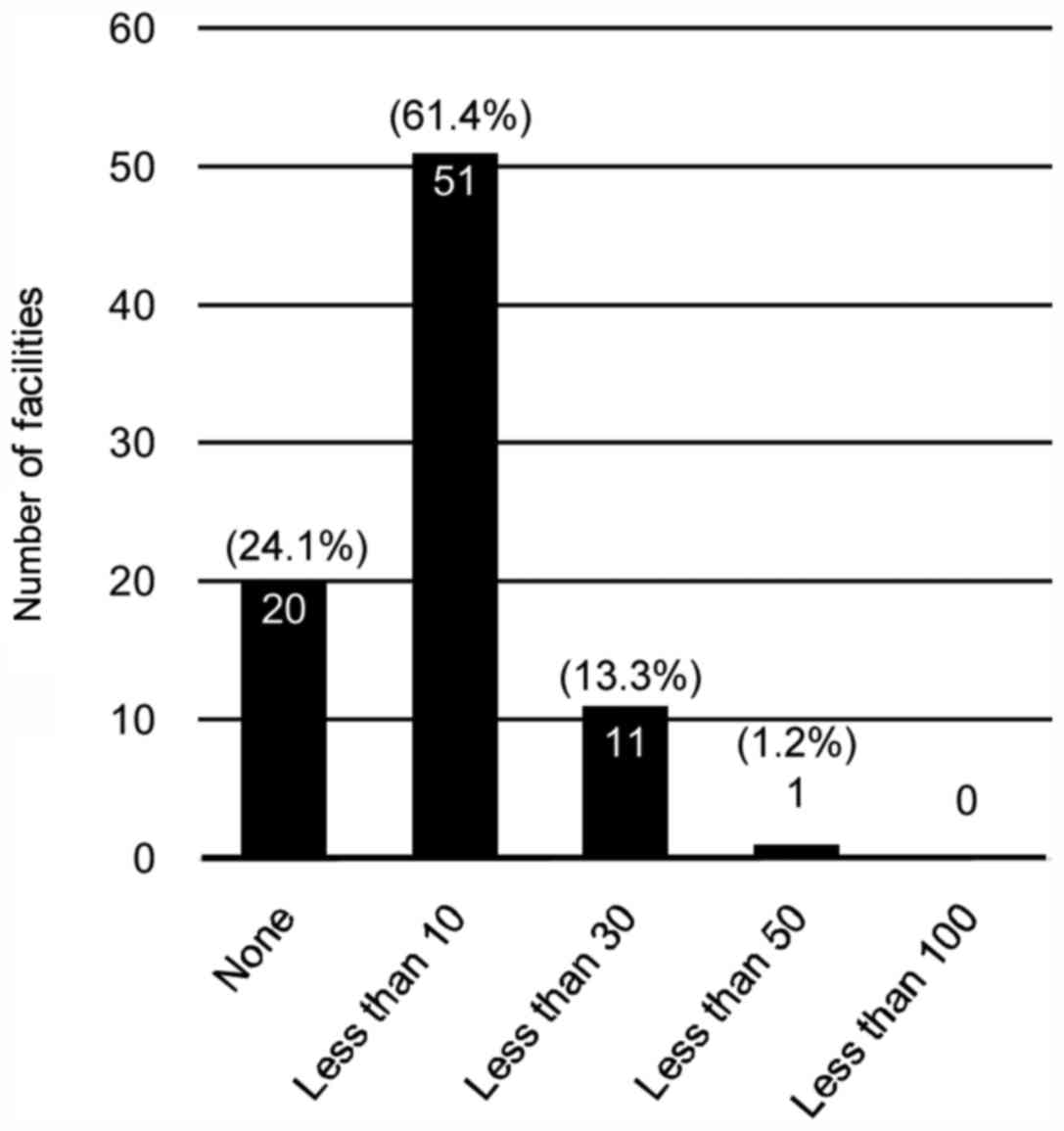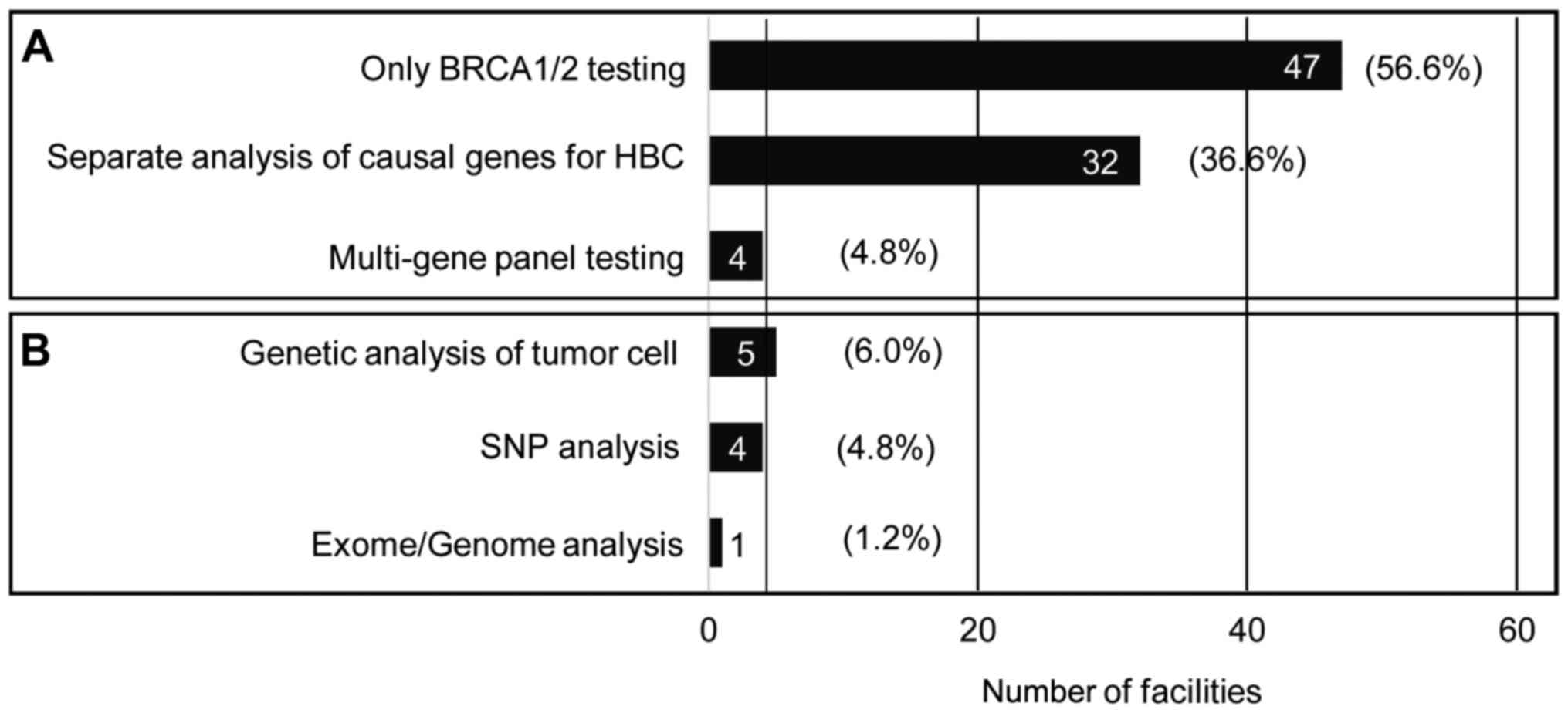|
1
|
Katanoda K, Kamo K, Saika K, Matsuda T,
Shibata A, Matsuda A, Nishino Y, Hattori M, Soda M, Ioka A, et al:
Short-Term projection of cancer incidence in Japan using an
age-period interaction model with spline smoothing. Jpn J Clin
Oncol. 44:36–41. 2014. View Article : Google Scholar : PubMed/NCBI
|
|
2
|
Foulkes WD: Inherited Susceptibility to
Common Cancers. N Engl J Med. 359:2143–2153. 2008. View Article : Google Scholar : PubMed/NCBI
|
|
3
|
Pharoah PD, Antoniou A, Bobrow M, Zimmern
RL, Easton DF and Ponder BA: Polygenic susceptibility to breast
cancer and implications for prevention. Nat Genet. 31:33–36. 2002.
View Article : Google Scholar : PubMed/NCBI
|
|
4
|
Harkness EF, Barrow E, Newton K, Green K,
Clancy T, Lalloo F, Hill J and Evans DG: Lynch syndrome caused by
MLH1 mutations is associated with an increased risk of breast
cancer: A cohort study. J Med Genet. 52:553–556. 2015. View Article : Google Scholar : PubMed/NCBI
|
|
5
|
Risch HA, McLaughlin JR, Cole DE, Rosen B,
Bradley L, Fan I, Tang J, Li S, Zhang S, Shaw PA and Narod SA:
Population BRCA1 and BRCA2 mutation frequencies and cancer
penetrances: A kin-cohort study in Ontario, Canada. J Natl Cancer
Inst. 98:1694–1706. 2006. View Article : Google Scholar : PubMed/NCBI
|
|
6
|
Mavaddat N, Peock S, Frost D, Ellis S,
Platte R, Fineberg E, Evans DG, Izatt L, Eeles RA, Adlard J, et al:
Cancer risks for BRCA1 and BRCA2 mutation carriers: Results from
prospective analysis of EMBRACE. J Natl Cancer Inst. 105:812–822.
2013. View Article : Google Scholar : PubMed/NCBI
|
|
7
|
Chen S and Parmigiani G: Meta-analysis of
BRCA1 and BRCA2 penetrance. J Clin Oncol. 25:1329–1333. 2007.
View Article : Google Scholar : PubMed/NCBI
|
|
8
|
Fostira F, Tsitlaidou M, Papadimitriou C,
Pertesi M, Timotheadou E, Stavropoulou AV, Glentis S, Bournakis E,
Bobos M, Pectasides D, et al: Prevalence of BRCA1 mutations among
403 women with triple-negative breast cancer: Implications for
genetic screening selection criteria: A Hellenic Cooperative
Oncology Group Study. Breast Cancer Res Treat. 134:353–362. 2012.
View Article : Google Scholar : PubMed/NCBI
|
|
9
|
Tai YC, Domchek S, Parmigiani G and Chen
S: Breast cancer risk among male BRCA1 and BRCA2 mutation carriers.
J Natl Cancer Inst. 99:1811–1814. 2007. View Article : Google Scholar : PubMed/NCBI
|
|
10
|
Gallagher DJ, Gaudet MM, Pal P, Kirchhoff
T, Balistreri L, Vora K, Bhatia J, Stadler Z, Fine SW, Reuter V, et
al: Germline BRCA mutations denote a clinicopathologic subset of
prostate cancer. Clin Cancer Res. 16:2115–2121. 2010. View Article : Google Scholar : PubMed/NCBI
|
|
11
|
Kirchhoff T, Kauff ND, Mitra N, Nafa K,
Huang H, Palmer C, Gulati T, Wadsworth E, Donat S, Robson ME, et
al: BRCA Mutations and Risk of Prostate Cancer in Ashkenazi Jews.
Clin Cancer Res. 10:2918–2921. 2004. View Article : Google Scholar : PubMed/NCBI
|
|
12
|
National Comprehensive Cancer Network, .
NCCN Clinical Practice Guidelines in Oncology (NCCN
Guidelines®) ‘Genetic/Familial High-Risk Assessment:
Breast and Ovarian’. https://www.nccn.org/professionals/physician_gls/f_guidelines.aspNovember
7–2016
|
|
13
|
Metcalfe K, Gershman S, Ghadirian P, Lynch
HT, Snyder C, Tung N, Kim-Sing C, Eisen A, Foulkes WD, Rosen B, et
al: Contralateral mastectomy and survival after breast cancer in
carriers of BRCA1 and BRCA2 mutations: Retrospective analysis. BMJ.
348:g2262014. View
Article : Google Scholar : PubMed/NCBI
|
|
14
|
Rebbeck TR, Kauff ND and Domchek SM:
Meta-analysis of risk reduction estimates associated with
risk-reducing salpingo-oophorectomy in BRCA1 or BRCA2 mutation
carriers. J Natl Cancer Inst. 101:80–87. 2009. View Article : Google Scholar : PubMed/NCBI
|
|
15
|
Domchek SM, Friebel TM, Neuhausen SL,
Wagner T, Evans G, Isaacs C, Garber JE, Daly MB, Eeles R, Matloff
E, et al: Mortality after bilateral salpingo-oophorectomy in BRCA1
and BRCA2 mutation carriers: A prospective cohort study. Lancet
Oncol. 7:223–229. 2006. View Article : Google Scholar : PubMed/NCBI
|
|
16
|
Yamamoto N, Nokihara H, Yamada Y, Goto Y,
Tanioka M, Shibata T, Yamada K, Asahina H, Kawata T, Shi X and
Tamura T: A phase I dose-finding and pharmacokinetic study of
olaparib (AZD2281) in Japanese patients with advanced solid tumors.
Cancer Sci. 103:504–509. 2012. View Article : Google Scholar : PubMed/NCBI
|
|
17
|
Lindor NM, Goldgar DE, Tavtigian SV, Plon
SE and Couch FJ: BRCA1/2 sequence variants of uncertain
significance: A primer for providers to assist in discussions and
in medical management. Oncologist. 18:518–524. 2013. View Article : Google Scholar : PubMed/NCBI
|
|
18
|
Eggington JM, Bowles KR, Moyes K, Manley
S, Esterling L, Sizemore S, Rosenthal E, Theisen A, Saam J, Arnell
C, et al: A comprehensive laboratory-based program for
classification of variants of uncertain significance in hereditary
cancer genes. Clin Genet. 86:229–237. 2014. View Article : Google Scholar : PubMed/NCBI
|
|
19
|
Desmond A, Kurian AW, Gabree M, Mills MA,
Anderson MJ, Kobayashi Y, Horick N, Yang S, Shannon KM, Tung N, et
al: Clinical actionability of multigene panel testing for
hereditary breast and ovarian cancer risk assessment. JAMA Oncol.
1:943–951. 2015. View Article : Google Scholar : PubMed/NCBI
|
|
20
|
Kapoor NS, Curcio LD, Blakemore CA,
Bremner AK, McFarland RE, West JG and Banks KC: Multigene panel
testing detects equal rates of pathogenic BRCA1/2 mutations and has
a higher diagnostic yield compared to limited BRCA1/2 analysis
alone in patients at risk for hereditary breast cancer. Ann Surg
Oncol. 22:3282–3288. 2015. View Article : Google Scholar : PubMed/NCBI
|
|
21
|
Ford D, Easton DF, Stratton M, Narod S,
Goldgar D, Devilee P, Bishop DT, Weber B, Lenoir G, Chang-Claude J,
et al: Genetic heterogeneity and penetrance analysis of the BRCA1
and BRCA2 genes in breast cancer families. The Breast Cancer
Linkage Consortium. Am J Hum Genet. 62:676–89. 1998. View Article : Google Scholar : PubMed/NCBI
|
|
22
|
Birch JM, Hartley AL, Tricker KJ, Prosser
J, Condie A, Kelsey AM, Harris M, Jones PH, Binchy A, Crowther D,
et al: Prevalence and diversity of constitutional mutations in the
p53 gene among 21 Li-Fraumeni families. Cancer Res. 54:1298–1304.
1994.PubMed/NCBI
|
|
23
|
Pilarski R: Cowden syndrome: A critical
review of the clinical literature. J Genet Couns. 18:13–27. 2009.
View Article : Google Scholar : PubMed/NCBI
|
|
24
|
Hearle N, Schumacher V, Menko FH,
Olschwang S, Boardman LA, Gille JJ, Keller JJ, Westerman AM, Scott
RJ, Lim W, et al: Frequency and spectrum of cancers in the
Peutz-Jeghers syndrome. Clin Cancer Res. 12:3209–3215. 2006.
View Article : Google Scholar : PubMed/NCBI
|
|
25
|
Apostolou P and Fostira F: Hereditary
breast cancer: The era of new susceptibility genes. Biomed Res Int.
2013.747–318. 2013.
|
|
26
|
Sussner KM, Jandorf L, Thompson HS and
Valdimarsdottir HB: Barriers and facilitators to BRCA genetic
counseling among at-risk Latinas in New York City. Psychooncology.
22:1594–1604. 2013. View
Article : Google Scholar : PubMed/NCBI
|
|
27
|
Anderson B, McLosky J, Wasilevich E,
Lyon-Callo S, Duquette D and Copeland G: Barriers and facilitators
for utilization of genetic counseling and risk assessment services
in young female breast cancer survivors. J Cancer Epidemiol.
2012:2987452012. View Article : Google Scholar : PubMed/NCBI
|
|
28
|
Chin TM, Tan SH, Lim SE, Iau P, Yong WP,
Wong SW and Lee SC: Acceptance, motivators and barriers in
attending breast cancer genetic counseling in Asians. Cancer Detect
Prev. 29:412–418. 2005. View Article : Google Scholar : PubMed/NCBI
|
|
29
|
Nakamura S, Takahashi M, Tozaki M,
Nakayama T, Nomizu T, Miki Y, Murakami Y, Aoki D, Iwase T,
Nishimura S, et al: Prevalence and differentiation of hereditary
breast and ovarian cancers in Japan. Breast Cancer. 22:462–468.
2015. View Article : Google Scholar : PubMed/NCBI
|

















